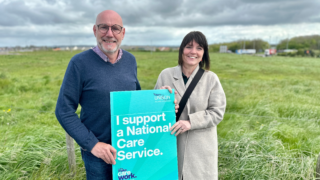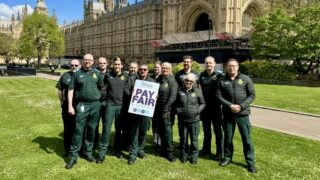Women in key worker positions across the South West are losing sleep, spending more on household bills, and worrying about the pandemic’s impact on their children’s education and mental health, according to a survey published today (Wednesday) by UNISON.
The findings are based on responses from over 3,500 women including teaching assistants, nurses, council workers and police staff. They provide a comprehensive insight into the emotional, physical and financial impact of Covid on critical public services staff who are keeping the region running.
The report Women Working Through the Pandemic includes the experiences of those providing a wide range of essential services in the South West including education, health, social care and policing, either in their usual workplace (55%) or from home (34%).
It shows the desperate situations key workers are facing and why they need proper time off and a pay rise, says UNISON. The findings are released ahead of UNISON’s Empowering Women virtual conference, which opens later today with a keynote address from new general secretary Christina McAnea.
Some have described being left to pay all the bills after the death of their partner from Covid or resorting to wrapping themselves in blankets to save on electricity bills.
The results show the huge strain of working during the Covid crisis with nearly two thirds (63%) not sleeping well, more than half (53%) not taking regular breaks and a significant number (57%) feeling stressed most of the time.
The impact of the pandemic on children is also a source of anxiety for many. Of the women who are parents, almost three in five (58%) are worried about the mental health of their children and more than two fifths (43%) are concerned about how their education is being affected.
The emotional impact of not being able to see friends or colleagues face to face – or look after themselves properly – is a major issue. The vast majority (92%) miss catching up with close friends in person, and many (48%) do not have time to reflect and destress. More than a third (37%) say they are experiencing loneliness.
Women who can least afford it are paying the biggest price, according to UNISON. 2,582 who took part in the survey – just over half (51%) – earn £18,000 a year or less, and a more than a third (38%) have an annual salary of £15,000 or less.
More than a third (37%) have seen their spending increase – especially on energy, food, technology, transport and housing. Reasons include having children off school all the time, a partner working from home or being furloughed.
Nearly half (47%) said being unable to get a regular hair cut or colour is affecting how they feel about themselves. Two fifths (41%) are not exercising regularly.
UNISON is calling on the government to ensure employers offer staff more flexibility over when they work and not to take long hours for granted, fund childcare properly so it’s affordable and accessible for key workers and maintain the £20 increase to the universal credit allowance.
UNISON South West regional secretary Joanne Kaye said: “Public services would have come to a standstill without the vital jobs done by women in our schools, hospitals, police forces and local councils.
“But employees are exhausted. They’re worn out from meeting work demands during Covid while caring for relatives, looking after children and dealing with debt. Those on low wages are the ones shouldering these burdens most of all.
“All women deserve better and this country’s economic recovery depends on them. But their mental and physical health is at stake.
“The government needs to step up by providing the funding and support to make their working lives easier.”



